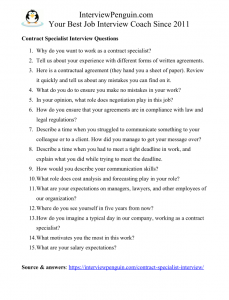Unless a company wants to rely on a gentleman’s agreements–which is a risky endeavor in the world of business, they need a good contract for each relationship they have with both their suppliers and customers.
Working as a Contract Specialist, you will be responsible for evaluating existing contrasts in the company, and for writing new contracts, based on the existing documents. You do not need to be a lawyer to have this job, or excel in legal terminology and law. That’s really not the case.
But you need to have strong attention to detail, business acumen, and ability to “work with words“–creating effective and meaningful contracts with the help of existing agreements and information you find online. Let’s have a look at the questions you may face while interviewing for this interesting position.
Table of Contents
Why do you want to work as a contract specialist?
Try to talk more about things you want to bring onboard the company, than about things you want to take from them, such as $55,000+ average annual salary this job typically pays.
For example, you can emphasize your impeccable reading and writing skills, strong attention to detail, and good understanding of their business field (or at least a strong interest in their field, and willingness to learn more). You have what it takes to become a great contract specialist, and that’s why you decided to apply.
You can also talk about a meaningful purpose of the job. Order should rule each business (or federal) relationship. Good contracts, ones take into account interests of both contract parties, are necessary to establish and retain order. You’d love to have a job in which you can actually make some difference, whether in a local community or in a company.
You can also opt for a simpler answer, saying that you like the job description, and think that the job suits both your strengths and personal preferences. You simply consider it a great match and decided to apply.
Tell us about your experience with different forms of written agreements.
You can have an experience with agreements, without ever working in the field. At the end of the day, you have certainly signed (and hopefully also read) dozens of agreements in your life (just think about insurance, mobile carrier, bank, etc).
If you lack professional experience, you can refer to this in your answer. Ensure the interviewers that you read each contract carefully, have a decent knowledge of principal sections on each contractual agreement, and that the field interests you greatly. Maybe you have even drafted some contracts before, for example renting your apartment to someone, or selling a more expensive item, etc.
Of course, if you have any professional experience with drafting or reading contracts, including relevant courses at school, you can explain what exactly you did, and which types of contracts you worked with.
Try to speak with enthusiasm about any work you did with contractual agreements. For most people, contracts are boring and they hate to read them (partially because they do not understand them). The hiring managers should not get an impression that you have the same attitude… That’s why your tone of voice and the way you talk about contracts matter.
Here is a contractual agreement (they hand you a sheet of paper). Review it quickly and tell us about any mistakes you can find on it.
Hiring manager may often test your abilities with a simple practical exercise. Now, they do not expect you to have an in-depth knowledge of law. You should not look for a mistake in a denomination of some legal paragraph or this sort of things. Look for more obvious mistakes, for example:
- Name, address, or a legal representative of a contracting party is missing.
- There is an obvious mistake in the formatting of the document, for example a wrong numbering of sections on the contract.
- Principal obligations are not clearly specified, or some important piece of information (for example the sum total of the contract) is missing.
- The date or the place is missing next to the signature (or next to the line for the signature).
Remember that they observe also the way in which you approach your task. Stay calm. Read the paper systematically, from the top to bottom. Make notes, and present them to the hiring managers.
And do not force an issue if you do not spot any apparent mistake. It can also be a trick, and they can hand you a bulletproof contract. In such a case you should just say a job well done…
What do you do to ensure you make no mistakes in your work?
You can start with a reference to your strong focus. Ensure the interviewers that you do not check your smart phone while working, and your mind does not wander somewhere (to a Friday evening or a football match you’ll watch soon). You always focus on the task at hand, the contract you are reading or drafting at the moment.
What’s more, you double check everything, and prefer a second person (your colleague, or external legal professional working for the company/organization) to make a final check of the contract. You understand that each mistake can prove costly in this job, and plan to approach each task at work with utmost responsibility.
In your opinion, what role does negotiation play in this job?
This really depends on the organization of responsibilities within the company or institution. In some places you’ll be responsible for negotiating with the suppliers and customers, in some other places you’ll be given the data and respond only for the making or reviewing of a contract.
Read the job description carefully. Do they write anything about negotiating the contract terms with their business partners? If they do, say that it plays an important role, and that you will always try to negotiate the most favorable contract conditions for your employer.
What’s more, you have excellent communication and problem solving skills, and believe that you will manage to lead such negotiations, understanding the expectations of both contract parties, and translating them into a meaningful and legally valid agreement.
How do you ensure that your agreements are in compliance with law and legal regulations?
Once again, this depends on the organization of responsibilities within the company. Perhaps they cooperate with a legal counsel, or even have a lawyer onboard. In such a case you can say that you will consult the professionals, or ask them to review the final draft of each contract.
If they do not cooperate with any legal professional, however, the responsibility may be on your shoulders. Ensure them that you either have the knowledge of laws and regulations in their field of business (you studied it, or obtained certification, or had a similar role before), or know where you can find such information.
At the end of the day, we live in 21st century. An intelligent person with strong attention to detail and with an ability to work with information, can find everything online. Governmental agencies and controlling bodies offer all necessary information on their websites.
Special Tip: Do you want to practice your interview answers later? Download the full list of questions in a one page long PDF, and practice anytime you want:

Describe a time when you struggled to communicate something to your colleague or to a client. How did you manage to get your message over?
Most people hate to read contracts because they do not understand them. The language is too complex, or they are lazy to think, or simply not gifted enough to comprehend the meaning of the words on the paper.
You may face this problem in your work quite often, and that’s exactly what you should focus on while describing a situation from the past.
Ensure the interviewers that you have an ability to explain complex things in a simple way. You can translate the language of law to the language of business people, and you do not mind stepping out of your comfort zone, using practical examples or demonstration to get your message over.
Remember that your attitude counts, not the particular situation you narrate in an interview. As long as they see that you try your best to help your audiences understand the contract terms, they will be happy with your interview answer…
Other questions you may face while interviewing for a job of a Contract Specialist
- Describe a time when you had to meet a tight deadline in work, and explain what you did while trying to meet the deadline.
- How would you describe your communication skills?
- What role does cost analysis and forecasting play in your role?
- Are you a detail-oriented person?
- What are your expectations on managers, lawyers, and other employees of our organization?
- Where do you see yourself in five years from now?
- What does integrity mean to you?
- How do you imagine a typical day in our company, working as a contract specialist?
- What motivates you the most in this work?
- Describe a time when you faced an ethical dilemma.
- Why shouldn’t we hire you?
Conclusion, great answers to all questions
Contract Specialist is an excellent entry level job that pays better than most other entry level positions. Each vacancy typically attracts a lot of applications, and you will face many competitors while trying to get this job.
What’s more, interviewers will typically ask you several tricky situational (scenario based) questions, and may also confront you with a practical test–asking you to review one of their existing contracts.
Everything combined, interview for a job of a Contract Specialist definitively belongs to difficult job interviews. If you are not sure how to answer the questions from my list, or experience interview anxiety, have a look at our Interview Success Package. Up to 10 premium answers to basically all questions you may face in your contract specialist job interview will help you streamline your interview preparation, find the right words in every moment of the interview, outclass your competitors, and eventually get the job. Thank you for checking it out, and I wish you good luck!
Matthew Chulaw, Your personal job interview coach
May also interest you:
- Contract Administrator interview questions.
- Billing Specialist interview questions.
- Employee Relations Specialist interview questions.

